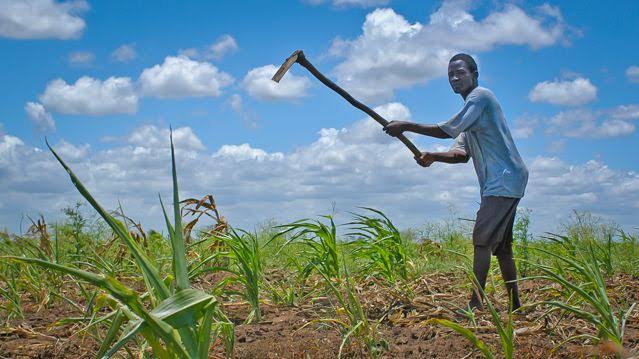Bangladesh among least favourable nations for farmers

Bangladesh has one of the least favourable regulatory environments for farmers although the country is still dependent on the agriculture sector for ensuring food security, poverty reduction and job creation, according to a new World Bank report.
Enabling the Business of Agriculture 2019—which was released recently—ranked Bangladesh 75th out of 101 countries as it scored 44.47 points on a scale of 0-100.
In South Asia, Bangladesh lagged behind India, Nepal, Pakistan, and Sri Lanka. India is ranked 54th, Sri Lanka 65th, Nepal 69th, and Pakistan 70th.
Bangladesh is only ahead of Afghanistan, which was ranked 90th.
The report is a World Bank Group study collecting unique data on the regulations that affect the livelihood of farmers.
Enabling the Business of Agriculture (EBA) covers 101 countries across all regions. The data are current as of June 30, 2018.
Countries with relatively small agricultural sectors (defined as less than $1 billion) are excluded, unless more than 100,000 people are employed in agriculture.
It provides data on eight quantitative indicators: supplying seed, registering fertiliser, securing water, registering machinery, sustaining livestock, protecting plant health, trading food, and accessing finance.
The EBA indicators assess whether governments make it easier or harder for farmers to operate their businesses and provide a tangible measure of progress and identify regulatory obstacles to market integration and entrepreneurship in agriculture.
The highest-scoring countries have regulation that caters to farmers’ needs. The three top-scoring countries are member states of the European Union.
France, Croatia and the Czech Republic pair good regulations with efficient processes across all areas measured, although no country received a perfect score, the report said.
“All governments have room to improve laws, regulations and bureaucratic processes that affect domestic farmers,” it said.
According to the report, the business climate for agriculture worldwide is improving. Forty-seven out of 101 countries measured implemented 67 regulatory reforms over two years making it easier for farmers to manage pest outbreaks, get quality seeds and access credit to invest in production.
Based on data collected between July 2016 and June 2018, more than half of reforms affecting farmers were enacted in the areas of protecting plant health, supplying seed and accessing finance.
Reforms in protecting plant health focused on pest management, with one-third of reforming countries establishing a requirement for citizens to report pest outbreaks. The report said Bangladesh considerably improved its seed certification capacity.
Bangladesh has enacted a new seed act that provides tools to improve the country’s capacity to certify seed by allowing the government to delegate seed certification activities to third parties including to the private sector.
“Bangladesh made it easier to trade agricultural products by publishing the official fee schedule of phyto-sanitary certificates both online and in the legislation,” the report said. It said successful regulatory reforms in the areas measured by the EBA help farmers increase their productivity.
Streamlining seed registration procedures in Bangladesh under the 1993 National Seed Policy, the precursor to the Seeds Amendment Act, increased maize yield levels. The number of registered maize varieties reached 98 and the maize yield increased by more than 180 percent from 1994 to 2010.
Bangladesh scored 18.52 points on supplying seed, 47.08 points on registering fertilizer, 20 points on securing water, 49.86 points on registering machinery, 56.67 points on sustaining livestock, 60 points on protecting plant health, 43.66 points on trading food, and 60 points on accessing finance.
Bangladesh is predominantly an agricultural country where the sector plays a vital role in accelerating the economic growth. The share of agriculture in total GDP has, however, declined over the years and stood at only 13.3 percent in 2018-19.
Agriculture still continues to employ approximately 41 percent of the labour force and plays an important role in poverty alleviation, according to the World Bank’s Bangladesh Development Update, which was released earlier this month.
The WB report underscores the need to accelerate reforms to tackle outdated legal provisions that do not meet farmers’ needs and remove bureaucratic obstacles that stifle business processes.
“We know that growth in agriculture is two to three times more effective at reducing poverty than growth in other sectors,” said Simeon Djankov, senior director for development economics of the WB, in a statement. “More needs to be done to support farmers through regulatory reforms so that they can grow their businesses and thrive.”
The statement said global agricultural production is expected to increase by 20 percent during the next decade as farming techniques become more efficient. Although it is up to governments to decide which regulatory changes are the most feasible, countries that have efficient regulatory processes in agriculture tend to have higher productivity.
“Increasing agricultural productivity in a sustainable manner is a priority in the race to fix food systems, so that farmers can produce higher quality food, feed growing populations and improve their livelihoods while reducing the impact of agriculture on climate and natural resources,” said Martien Van Nieuwkoop, global director for agriculture and food of the World Bank.
“The efficient operation of players all along the food chain also facilitates farmer productivity and the sale of quality food, while avoiding food loss and waste.”
One way for policy makers to support farmers is to enact regulations that enable a more efficient provision of agricultural inputs --such as seeds, fertilizer, animal feed, veterinary medicinal products and water, promote access to finance, and facilitate market transactions.
